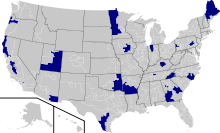- Blue Dog Coalition
-
The Blue Dog Coalition, commonly known as the Blue Dogs, is a group of United States Congressional Representatives from the Democratic Party who identify themselves as moderates.[1]
It was formed in 1995[2][3] during the 104th Congress to give more conservative members from the Democratic party a unified voice after the Democrats' loss of Congress in the U.S. Congressional election of 1994.[4] Blue Dog Coalition membership for the 112th Congress is 26 seats, down from 54 seats in the 111th Congress.
Contents
History
 Barack Obama meets with Blue Dog Democrats on February 10, 2009
Barack Obama meets with Blue Dog Democrats on February 10, 2009
The term "Blue Dog Democrat" is credited to Texas Democratic Rep. Pete Geren (who later joined the Bush Administration). Geren opined that the members had been "choked blue" by "extreme" Democrats from the left.[5] It is related to the political term "Yellow Dog Democrat," a reference to southern Democrats said to be so loyal they would even vote for a yellow dog if it were labeled Democrat. The term is also a reference to the "Blue Dog" paintings of Cajun artist George Rodrigue of Lafayette, Louisiana, as the original members of the coalition would regularly meet in the offices of Louisiana representatives Billy Tauzin and Jimmy Hayes, both of whom later joined the Republican Party; both had Rodrigue's paintings on their walls.[6][7] An additional explanation for the term cited by members is "when dogs are not let into the house, they stay outside in the cold and turn blue," a reference to the Blue Dogs' belief they had been left out of a Party that they believed had shifted to the political left.[8]
Although its membership is not exclusively Southern, some[9][10] view the Blue Dogs as the political successors to a now defunct-in-name Southern Democratic group known as the Boll Weevils, who played a critical role in the early 1980s by supporting President Ronald Reagan's tax cut plan. The Boll Weevils, in turn, may be considered the descendants of the Dixiecrats and the "states' rights" Democrats of the 1940s through the 1960s.[11]
The coalition was notably successful in a special election of February 2004 in Kentucky to fill a vacant seat in the House of Representatives.[citation needed] They were also successful in the November 2004 elections, when three of the five races in which a Democrat won a formerly Republican House seat were won by Blue Dogs.
In 2005, the members of the Blue Dog Coalition voted 32 to 4 in favor of the bill to limit access to bankruptcy protection (S 256).
While the Blue Dog Coalition is made up of House members, the term "Blue Dog" is sometimes used informally for Democratic senators, governors, or state legislators who resemble the Blue Dog Coalition positions based on their politics. Current such Senators include Ben Nelson (D-NE) and the newly elected Joe Manchin (D-WV).
110th Congress
In 2006, Blue Dog candidates such as Jason Altmire, Heath Shuler, and Brad Ellsworth were elected in conservative-leaning districts, ending years of Republican dominance in these areas. The group is the rough equivalent of the Republican Main Street Partnership.
In 2007, 15 Blue Dog Coalition Members in safe seats refused to contribute party dues to the Democratic Congressional Campaign Committee. An additional 16 Blue Dogs have not paid any money to the DCCC but were exempt from party-mandated contributions because they were top GOP targets for defeat in 2008. One reason for the party-dues boycott is contained in remarks made by Rep. Lynn Woolsey (D-Calif.) encouraging leaders of anti-war groups to field primary challenges to any Democrat who does not vote to end the war in Iraq. Woolsey later stated that she was misunderstood, but the Blue Dogs have continued with the boycott. Donations to party Congressional Committees are an important source of funding for the party committees, permitting millions of dollars to be funneled back into close races.[12]
111th Congress
In the summer of 2009, The Economist magazine said "[t]he debate over health care... may be the pinnacle of the group’s power so far" and quoted Charlie Stenholm, a founding Blue Dog, as saying that "this is the first year for the new kennel in which their votes are really going to make a difference."[13]
112th Congress
The Blue Dog Coalition suffered serious losses in the 2010 midterm elections, losing over half of its seats to Republican challengers. Its members, who comprised roughly one quarter of the Democratic Party's caucus in the 111th Congress, accounted for half of the party's midterm election losses.[14] Including retirements, Blue Dog numbers in the House were reduced from 54 members in 2008 to 26 members in 2010, and two of the Coalition's four leaders (Stephanie Herseth Sandlin and Baron Hill) failed to secure re-election.[15][16]
Ideology
Blue Dogs purport to have an agenda that protects the interests of the vulnerable while also respecting traditional cultural values and keeping taxes low. Others, including fellow members of the Democratic Party, have questioned the veracity of this mission statement.
The Blue Dog Coalition is often involved in searching for a compromise between liberal and conservative positions. The Blue Dogs are viewed by some as a continuation of the socially conservative wing of the Democratic party prominent during the presidency of Harry S. Truman.[citation needed] However, the only stated policy position of the Blue Dogs is fiscal conservatism.
Despite the Blue Dogs' differing degrees of economic and social conservatism, they claim they generally work to promote positions within the House of Representatives that bridge the gap between right-wing and left-wing politics. Blue Dogs are an important swing vote on spending bills and as a result have gained influence in Congress out of proportion to their numbers. They are frequently sought after to broker compromises between the Democratic and Republican leadership, generally lending a more centrist character to US politics.
Funding
The biggest single source of finance for the Blue Dog Political Action Committee is the health care industry, which donated $1.2 million in the 2009-10 election cycle.[17] In July 2009, Blue Dog members who were committee members of the House Energy and Commerce Committee successfully delayed the House vote on the Health Insurance Reform Bill (HR3200)) until after the Summer Recess.[18]
Political relationships
New Democrat Coalition
Members of the New Democrat Coalition, an affiliate of the Democratic Leadership Council (DLC), take moderate or liberal positions on social issues[citation needed] and moderate positions on economic issues and trade. The DLC aims to revitalize and strengthen the Democratic party, while the Blue Dogs emphasize bipartisanship.[citation needed]
Democrats who identify with the Blue Dogs tend to be conservatives, but have more divergent positions on social issues than "New Democrats." Reflecting the group's Southern roots, many Blue Dogs are strong supporters of gun rights and receive high ratings from the National Rifle Association, some have pro-life voting records, and some get high ratings from immigration reduction groups. As a caucus, however, the group has never agreed on or taken a position on these issues, and many members favor more socially liberal positions.
On economic issues, Blue Dogs tend to be pro-business and favor limiting public welfare spending. They have supported welfare reduction as well as the Republican-backed Bankruptcy Reform Act of 2005. They have differing positions on trade issues, and include both supporters and strong critics of labor unions, protectionism, and other populist measures. New Democrats tend to favor free trade.
Some Democrats, such as Congresswoman Gabrielle Giffords of Arizona, are members of both the Blue Dog Coalition and the New Democratic Coalition.
Liberals
Some in the Democratic Party's liberal wing promote primary challenges against Blue Dog Coalition members in an effort to unseat Democratic Party members they view as unreliable or too conservative.[citation needed] The editors of the left-wing weblog OpenLeft refer to Blue Dog Democrats who voted for war funding in May 2007[19] and voted to grant the Executive branch warrantless wiretapping powers[20] as "Bush Dogs".[21][22] Others in the party view these individuals as "Republicans in Democrats Clothing".
Membership
 Districts represented by members of the Blue Dog Coalition in 2009, during the 111th United States Congress.
Districts represented by members of the Blue Dog Coalition in 2009, during the 111th United States Congress.
Blue Dog membership was nearly cut in half by the 2010 Election, in which 26 members were re-elected but 28 were either defeated or chose not to run for re-election.
The membership is expected to decline further in the 113th Congress. Membership is already down to 25 with the resignation of Jane Harman, one of their more liberal members. Furthermore, two prominent remaining Blue Dogs, Dan Boren of Oklahoma and Mike Ross of Arkansas, have announced their retirement; one member, Joe Donnelly of Indiana, is running for Senate; and more members, such as North Carolina's Heath Shuler and Mike McIntyre, have been or will be targeted by Republicans in redistricting efforts.[23]
Freshman Blue Dogs in the House are sometimes nicknamed "Blue Pups".[6]
Members in the 112th Congress
- Jason Altmire (PA-4)
- Joe Baca (CA-43)
- John Barrow (GA-12), Co-Chair for Policy
- Sanford Bishop (GA-2)
- Dan Boren (OK-2), Blue Dog Whip
- Leonard Boswell (IA-3)
- Dennis Cardoza (CA-18)
- Ben Chandler (KY-6)
- Jim Cooper (TN-5)
- Jim Costa (CA-20)
- Henry Cuellar (TX-28)
- Joe Donnelly (IN-2)
- Gabrielle Giffords (AZ-8)
- Tim Holden (PA-17)
- Jim Matheson (UT-2)
- Mike McIntyre (NC-7)
- Mike Michaud (ME-2)
- Collin Peterson (MN-7)
- Mike Ross (AR-4), Co-Chair for Communications
- Loretta Sanchez (CA-47)
- Adam Schiff (CA-29)
- Kurt Schrader (OR-5)
- David Scott (GA-13)
- Heath Shuler (NC-11), Co-Chair for Administration
- Mike Thompson (CA-1)
Members who didn't run for House re-election in 2010
- Robert Marion Berry (AR-1)
- Brad Ellsworth (IN-8) (ran for Senate in 2010, lost)
- Bart Gordon (TN-6)
- Charlie Melancon (LA-3), Blue Dog Co-Chair for Communications (ran for Senate in 2010, lost)
- Dennis Moore (KS-3)
- John Tanner (TN-8)
Members defeated in 2010 election
- Mike Arcuri (NY-24)
- Melissa Bean (IL-8)
- Allen Boyd (FL-2)
- Bobby Bright (AL-2)
- Chris Carney (PA-10)
- Travis Childers (MS-1)
- Kathy Dahlkemper (PA-3)
- Lincoln Davis (TN-4)
- Stephanie Herseth Sandlin (SD-AL), Blue Dog Co-Chair for Administration
- Baron Hill (IN-9), Blue Dog Co-Chair for Policy
- Frank Kratovil (MD-1)
- Betsy Markey (CO-4)
- Jim Marshall (GA-8)
- Walt Minnick (ID-1)
- Harry Mitchell (AZ-5)
- Patrick Murphy (PA-8)
- Scott Murphy (NY-20)
- Glenn Nye (VA-2)
- Earl Pomeroy (ND-AL)
- John Salazar (CO-3)
- Zack Space (OH-18)
- Gene Taylor (MS-4)
- Charlie Wilson (OH-6)
Former members
Prominent Blue Dog Coalition members who have left the House or the coalition include:
- Brad Carson (OK-2) (retired from the House to run for the Senate in 2004, losing to Republican Tom Coburn)
- Gary Condit (CA-18) (defeated by Dennis Cardoza in 2002 Democratic primary)
- Bud Cramer (AL-5) (retired from the House in 2009)
- Harold Ford Jr. (TN-9) (retired from the House to run for the Senate in 2006, losing to Republican Bob Corker)
- Kirsten Gillibrand (NY-20) (appointed to Senate in 2009)
- Parker Griffith (AL-5) (became a Republican in 2009, defeated in 2010 Republican primary by Mo Brooks)
- Ralph Hall (TX-4) (became a Republican in 2004 and is still a member of the House)
- Jane Harman (CA-36) (resigned in 2011)
- Nick Lampson (TX-22) (defeated by Republican Pete Olson in 2008)
- Bill Lipinski (IL-3) (retired from the House in 2005)
- Ken Lucas (KY-4) (retired from the House in 2005)
- Tim Mahoney (FL-16) (defeated by Republican Tom Rooney in 2008)
- David Minge (MN-2) (defeated by Republican Mark Kennedy in 2000)
- David D. Phelps (IL-19) (defeated by Republican John Shimkus following 2002 redistricting)
- Owen Pickett (VA-2) (retired from the House in 2001)
- Max Sandlin (TX-1) (defeated by Republican Louie Gohmert following 2003 Texas redistricting)
- Charlie Stenholm (TX-17) (defeated by Republican Randy Neugebauer following 2003 Texas redistricting)
- Billy Tauzin (LA-3) (became a Republican in 1995)
- Jim Turner (TX-2) (retired from House following 2003 Texas redistricting)
See also
- Boll weevil
- Democrat In Name Only
- Congressional Progressive Caucus
- Dixiecrat
- Libertarian Democrat
- New Democrat Coalition
- Red Tory
- Yellow dog Democrat, a person who will vote for any Democratic candidate
References
- ^ "Blue Dog Coalition". House.gov. 2009-04-27. http://www.house.gov/melancon/BlueDogs/. Retrieved 2010-03-17.
- ^ "Blue Dog Coalition". House.gov. 2009-04-27. http://www.house.gov/melancon/BlueDogs/index.html. Retrieved 2010-03-17.
- ^ Blue Dog Coalition
- ^ Naftali Bendavid (2009 July 28) 'Blue Dog' Democrats Hold Health-Care Overhaul at Bay The Wall Street Journal
- ^ WordCraft, November 11, 2004
- ^ a b Suddath, Claire (July 28, 2009). "A Brief History of Blue Dog Democrats". Time. http://www.time.com/time/politics/article/0,8599,1913057,00.html. Retrieved 2009-09-07.
- ^ Safire, William (April 23, 1995). "On Language; Blue Dog Demo". New York Times. http://www.nytimes.com/1995/04/23/magazine/on-language-blue-dog-demo.html. Retrieved 2009-09-07.
- ^ "Blue Dog Democrats". Bluedogs.us. 2008-11-04. http://www.bluedogs.us/index.htm. Retrieved 2010-03-17.
- ^ Parties, Rules, and the Evolution of Congressional Budgeting, Lance T. LeLoup, 2005, pp. 185
- ^ Encyclopedia of American Parties, Campaigns, and Elections, William C. Binning et al, 1999, pp. 307
- ^ Thomson, Alex (2007). A Glossary of U.S. Politics and Government. Stanford University Press. p. 14. ISBN 0804757305.
- ^ Bresnahan, John (2007-10-24). "Blue Dogs refuse to pony up for DCCC". The Politico. http://dyn.politico.com/printstory.cfm?uuid=CF01E1BF-3048-5C12-00AB01E6FB9129B8. Retrieved 2007-11-01.
- ^ "The Democratic Party's centrists: Blue Dog days". The Economist. 2009-07-30. http://www.economist.com/world/unitedstates/displaystory.cfm?story_id=14140214.
- ^ "Blue Dogs Shaved in Half - Blue Dog Democrats - Fox Nation". Fox News. 2010-11-03. http://nation.foxnews.com/blue-dog-democrats/2010/11/03/blue-dogs-shaved-half.
- ^ http://www.politico.com/blogs/glennthrush/1110/Blue_Dog_wipeout_Half_of_caucus_gone.html?showall
- ^ "A vanishing breed: Blue Dogs". Los Angeles Times. 2010-11-03. http://opinion.latimes.com/opinionla/2010/11/a-vanishing-breed-blue-dogs.html.
- ^ Hiltzik, Michael (2009-08-03). "What's so great about private health insurance? - Los Angeles Times". Latimes.com. http://www.latimes.com/business/la-fi-hiltzik3-2009aug03,0,6650122.column. Retrieved 2010-03-17.
- ^ "Are the Blue Dogs Really Working For You? « Silver Buzz Cafe". Silverbuzzcafe.com. 2009-08-20. http://silverbuzzcafe.com/?p=2649. Retrieved 2010-03-17.
- ^ http://clerk.house.gov/evs/2007/roll425.xml
- ^ http://clerk.house.gov/evs/2007/roll836.xml
- ^ Stoller, Matt (2007-08-30). "What is a Bush Dog Democrat? A FAQ...". OpenLeft. http://www.openleft.com/showDiary.do?diaryId=1075. Retrieved 2007-11-01.
- ^ Stoller, Matt (2007-08-30). "Why Profile a Bush Dog?". OpenLeft. http://www.openleft.com/showDiary.do?diaryId=1073. Retrieved 2007-11-01.
- ^ Cillizza, Chris; Rachel Weiner (26 July 2011). "Blue Dog Democrats a Dying Breed". Washington Post. http://www.washingtonpost.com/blogs/the-fix/post/blue-dog-democrats-a-dying-breed/2011/07/25/gIQA7KGoaI_blog.html. Retrieved 3 August 2011.
External links
- Blue Dog Coalition homepage
- Blue Dog PAC homepage
- About.com's Meet the Blue Dog Coalition, Moderate Democratic Members of the House of Representatives
- C-Span article by Ilona Nickels on Blue Dogs
- Future of American Democracy: Academic site of Dr. Glen Browder, founding member of the Blue Dog Coalition
- Texas Blue Dog Coalition
- Right-Leaning "Blue Dogs" Lose Seats in 2010 Election - video report by Democracy Now!
Categories:- Caucuses of the United States Congress
- Centrist political advocacy groups in the United States
- Democratic Party (United States) organizations
- Political party factions in the United States
- Conservatism in the United States
- American political terms
Wikimedia Foundation. 2010.

